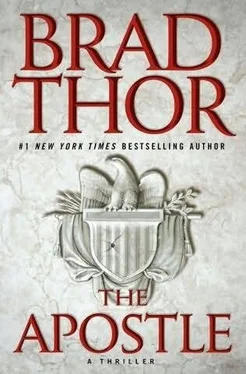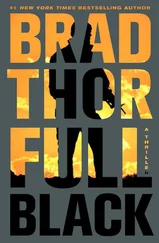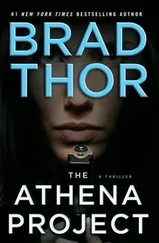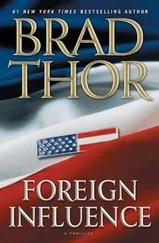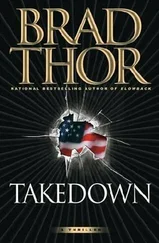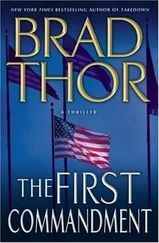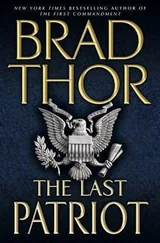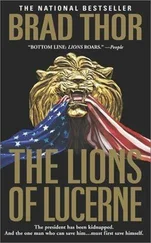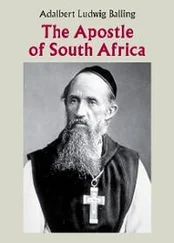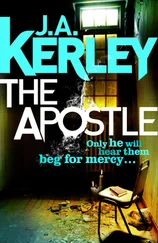Brad Thor - The Apostle
Здесь есть возможность читать онлайн «Brad Thor - The Apostle» весь текст электронной книги совершенно бесплатно (целиком полную версию без сокращений). В некоторых случаях можно слушать аудио, скачать через торрент в формате fb2 и присутствует краткое содержание. Жанр: Триллер, на английском языке. Описание произведения, (предисловие) а так же отзывы посетителей доступны на портале библиотеки ЛибКат.
- Название:The Apostle
- Автор:
- Жанр:
- Год:неизвестен
- ISBN:нет данных
- Рейтинг книги:5 / 5. Голосов: 1
-
Избранное:Добавить в избранное
- Отзывы:
-
Ваша оценка:
- 100
- 1
- 2
- 3
- 4
- 5
The Apostle: краткое содержание, описание и аннотация
Предлагаем к чтению аннотацию, описание, краткое содержание или предисловие (зависит от того, что написал сам автор книги «The Apostle»). Если вы не нашли необходимую информацию о книге — напишите в комментариях, мы постараемся отыскать её.
The Apostle — читать онлайн бесплатно полную книгу (весь текст) целиком
Ниже представлен текст книги, разбитый по страницам. Система сохранения места последней прочитанной страницы, позволяет с удобством читать онлайн бесплатно книгу «The Apostle», без необходимости каждый раз заново искать на чём Вы остановились. Поставьте закладку, и сможете в любой момент перейти на страницу, на которой закончили чтение.
Интервал:
Закладка:
“You can monkey with that all you want,” admonished Gallagher. “It won’t do any good until the engine heats up.”
“Really?” Harvath replied as he took another sip of Red Bull.
Baba G was about to explain when he realized that Harvath was being facetious. For a moment, he had forgotten who he was with. Harvath had used humor to deal with good situations and bad for as long as he had known him. He decided to change the subject. “How’s Tracy doing?”
Harvath had been so exhausted, he honestly hadn’t thought much about her since he’d landed in Kabul. He’d learned a long time ago that one of the keys to being successful and staying alive in his line of work was the ability to compartmentalize. If you couldn’t put the rest of your life in a box and keep a lid on it while you were in the field, this wasn’t the career for you.
Gallagher was an old friend, though, and the question wasn’t out of bounds. Still, the relationship with Tracy was complicated. “She’s good,” he replied.
“Are her headaches any better?”
This was where things got complicated. Tracy had been shot almost two years ago by someone with a very serious vendetta against Harvath. She had survived and recovered, but not 100 percent. The doctors had advised her to avoid stress as much as possible. There had been little to no stress in Maine. In fact, they had joked that it had been like spending the winter inside a snow globe. But the net effect on Tracy’s headaches had been negligible. She still got them and when she did, she had to pop some pretty strong medication to beat them back. Tracy was tough and she refused to give up. She also, however, refused to move forward.
An ex-Navy Explosive Ordnance Disposal technician, she had seen danger up close and had even had an IED she was defusing detonate prematurely and take one of her eyes. The doctors had matched it perfectly and you had to look very closely to notice any of the scarring her face had suffered. Lesser people would have given up, but not Tracy, and Scot admired the hell out of her for that.
Where she refused to move forward was in their relationship. Harvath wanted to get married and Tracy didn’t. She knew how badly Scot wanted children and she just didn’t think she could handle the headaches and kids. They were engaged in a quiet stalemate and had been most of the winter.
On the job front, Harvath couldn’t have hoped for a person more understanding or supportive of his career. Tracy was content keeping the home fires burning for as long as his assignments took him wherever they took him. She appreciated both the danger and the fact that this work was what he was born to do. She would never make him decide between being with her or pursuing his career. Tracy allowed him both. What she asked in return was to accept their relationship as it was and to not ask her to make any changes.
It sounded reasonable, but the longer he and Tracy were together, the more he realized what a great mother she would be-even with the headaches. Harvath wanted kids and he wanted to have them with her. He still held out hope, as dim as he knew it was, that Tracy might change her mind and come around.
“The headaches are still the same,” said Harvath. “Regularly irregular and when they come they’re pretty tough.”
“Have you guys seen any specialists?”
“Tons,” replied Harvath as he took another sip of Red Bull.
“That sucks,” said Gallagher.
Harvath attempted to change the subject. “How long have you known this police inspector we’re going to see?”
“Ahmad?” asked Gallagher as he did the math in his head. “About three years now.”
“And you trust him?”
Baba G laughed. “If I didn’t, we wouldn’t be going to Kabul’s version of South Central LA for this meeting. Don’t worry. He’s good people.”
Don’t worry. It was a funny piece of advice coming from the man who had insisted upon seeing Harvath’s “Afghan walk.”
“Normally, we just meet to gossip. Sometimes, we trade pieces of intelligence. This is the first time I’m going to offer him money for something.”
Harvath looked at him. “Any reason to believe that might change things between you?”
“If anything, it’ll probably make me more valuable to him and technically, I’m not giving him any money, you are. Ahmad and I are just facilitators, or fixers, as they say. I’m hooking you up with him and then hopefully he’ll hook you up with some information.”
“Hopefully,” repeated Harvath.
“Don’t worry,” Gallagher said yet again.
As they drove toward their rendezvous, the streets were as crowded as they had been before. Men rode three and sometimes even four to a motorbike. Yellow and white taxis were everywhere, as were donkey carts and bicycles. Cars were parked halfway on sidewalks and men stood in the road every fifteen feet selling prepaid phone cards. Baba G had the Land Cruiser’s radio tuned to an Afghan station with music that sounded like a Bollywood sound track.
They passed the normally anemic Kabul River, which was swollen with spring runoff, and had to stop for two men who were driving a flock of dirty sheep out of a muddy alley and across the road. All the while, Harvath kept his eyes alert for trouble. His local garb might help in not drawing attention to himself, but he had no doubt that he still looked every bit the American and that he was one big target.
He pressed the Glock hidden beneath his tunic for reassurance, and when he looked over at Baba G, he saw that he was not only watching the traffic, but scanning the sidewalks and parked cars for danger as well. Kabul was like a Wild West town surrounded by Indian country. There wasn’t one single place where you could let your guard down.
When they reached the restaurant, there weren’t any parking spaces available in front and Baba G had to park about a block down. “Don’t leave any valuables in the car,” he cautioned.
Harvath tapped his side and replied, “Don’t worry.”
The restaurant was housed in a two-story concrete structure with a dark green corrugated metal awning hanging over the sidewalk. On the ground floor was a small shop selling household odds and ends like the one Harvath had sent Flower to for extra blankets. Next to the shop was a door that opened onto a staircase leading to the building’s second floor. Harvath tried to make out the writing on the door as they approached.
“Private club,” offered Gallagher. “Pashtuns only.”
“Seriously?” asked Harvath.
“Not really, but the sign is written only in Pashtu, not Dari, so the message is pretty clear. If you’re not Pashtun, find someplace else to eat.”
Harvath was well aware of how the hierarchies operated here. Afghan identity followed a clear trajectory of loyalty. Family came first, then clan, village, tribe, and finally, at the bottom of the list, was national identity as a citizen of Afghanistan.
Afghan tribalism was pervasive throughout the country and was a big reason why it was so fractured. Pashtuns, who accounted for roughly 45 percent of the population, hated the Tajiks, and Tajiks, who made up 25 percent of the population, hated the Pashtuns. Together, the Pashtuns and Tajiks both hated the 10 percent minority Hazaras, and the tribalism continued right down the ladder to include the lowly Uzbeks, Turkmen, Baluchi, Nuristanis, and all the other minority groups.
The only time the tribes worked together was when they united to repel an outside invader. After the invader was sent packing, the tribes went back to waging war against each other. In essence, Afghanistan was both its own best ally and its own worst enemy.
If you wanted to develop contacts with the most powerful people in the Afghan government, the Pashtuns were the ones to be in bed with. From the president of Afghanistan on down, the Pashtuns occupied the most important posts. Though the government was working hard to desegregate its infrastructure, it still had a long way to go and Baba G had been wise to align himself with a highly placed Pashtun police inspector. Harvath just hoped the man would have the information they needed.
Читать дальшеИнтервал:
Закладка:
Похожие книги на «The Apostle»
Представляем Вашему вниманию похожие книги на «The Apostle» списком для выбора. Мы отобрали схожую по названию и смыслу литературу в надежде предоставить читателям больше вариантов отыскать новые, интересные, ещё непрочитанные произведения.
Обсуждение, отзывы о книге «The Apostle» и просто собственные мнения читателей. Оставьте ваши комментарии, напишите, что Вы думаете о произведении, его смысле или главных героях. Укажите что конкретно понравилось, а что нет, и почему Вы так считаете.
